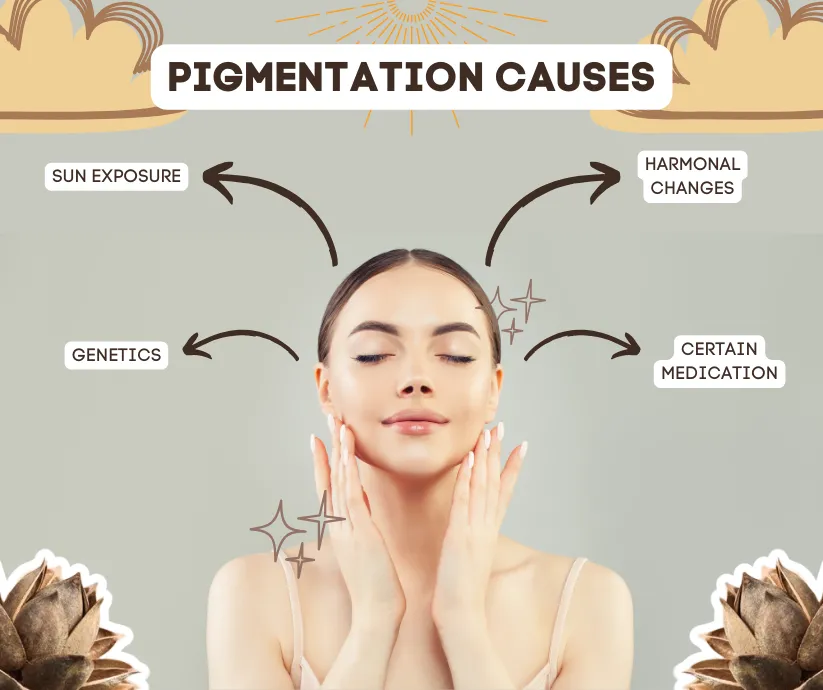Does Coconut Oil Influence Melanin Production?
Melanin is a crucial component in determining our skin’s protective response against external factors, especially the sun’s harmful ultraviolet rays. While it bestows us with varying shades of skin color, lending beauty in diversity, its primary function is protective. Overproduction or uneven distribution of this pigment leads to conditions like hyperpigmentation. In recent years, natural remedies, including coconut oil, have gained traction in skincare discussions. As the beauty industry shifts its gaze to organic solutions, understanding the intricate relationship between coconut oil and melanin becomes even more pertinent.
Pigmentation Causes

- Sun Exposure: The sun emits harmful ultraviolet (UV) rays that can increase melanin production in the skin, leading to dark spots and uneven skin tone. Prolonged exposure without proper sun protection is a leading cause of hyperpigmentation.
- Hormonal Changes: Melasma, also known as the ‘mask of pregnancy,’ is a form of hyperpigmentation caused by hormonal fluctuations. It’s common among pregnant women and those taking birth control pills or hormone replacement therapy.
- Genetics: Some people are genetically predisposed to developing certain types of hyperpigmentation. For instance, if family members have freckles or melasma, you might be more prone to experiencing them as well.
- Certain Medications: Some drugs, including certain antibiotics, antimalarial drugs, and anti-seizure medications, can increase melanin production, leading to pigmentation issues. This reaction is often exacerbated by sun exposure.
Coconut Oil and Melanin: What We Know
Direct Influence:
While coconut oil boasts numerous benefits, from hair care to cooking, its connection with melanin production is not direct. Scientific studies have not found conclusive evidence suggesting that coconut oil has an impact on melanin production. Genetics and sun exposure remain the dominant factors influencing skin’s melanin content.
Enhancing Sun Exposure:
Coconut oil’s rich, emollient properties can impart a glossy sheen to the skin. This reflective quality might give the illusion of a deeper tan when the skin is sun-kissed. However, this doesn’t equate to an increase in melanin; it’s more about the optical effect that the oil creates on the skin.
Low Sun Protection:
Coconut oil is sometimes misconstrued as a sunblock. While it does offer minimal sun protection, relying solely on it is not recommended. Its low SPF means that the skin remains vulnerable to UV radiation. Excessive exposure without proper protection can prompt the skin to produce more melanin as a protective response, but it can also lead to sunburn and other UV-induced skin issues.
Safety First
Use Sunscreen:
Coconut oil, when used as a part of your skincare routine, should not replace sunscreen. It’s imperative to use a broad-spectrum sunscreen with high SPF, especially when spending extended periods outdoors. This provides a shield against UVA and UVB rays, minimizing the risk of sunburn and premature aging.
Avoid Over-exposure:
While sun exposure is essential for vitamin D synthesis and uplifts mood, moderation is crucial. It’s advisable to seek shade, wear protective clothing, and avoid the sun’s rays when they are strongest, typically between 10 a.m. and 4 p.m. Continuous sun exposure without protection can not only lead to an increase in melanin but also raise the risk of skin diseases, including skin cancer.
Regular skin care, combined with informed choices, ensures the skin remains healthy while maximizing the benefits of natural products like coconut oil.
For a deeper understanding of natural oils and their effects on the skin, consider reading our exploration on How Oils Affect Skin Health.

